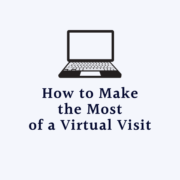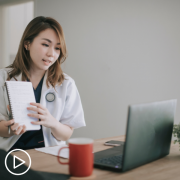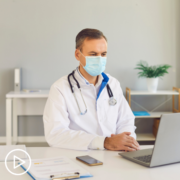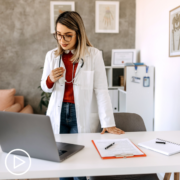How to Make the Most of a Virtual Visit
“Well, we need to check your titer,” the doctor explained as he went over my lab results via a recent Zoom call. “Titer?” I thought. I know I’ve heard that term before, but I wasn’t really sure what it meant. The doctor reappeared the word a few more times, exacerbating my confusion. I was too embarrassed to ask what he meant; he was talking quickly. When he eventually said, “The titer is the strength of the antibodies in your blood,” I finally understood and felt more at ease.
As we face this pandemic, chronic and/or rare disease patients like myself are facing an extension of the “new normal” that everyone is experiencing firsthand. Our doctor’s appointments are critical times when we’re able to explain how we’re feeling, how our medication may or may not be working, and what the next steps are. But our visits become different when our face to face sessions turn virtual. I believe we become more vulnerable, as we invite the doctors into our home lives.
While healthcare has certainly come a long way and telemedicine has been on the horizon, virtual visits are now the norm. We have been placed, both as patient and healthcare professionals, in a position that allows us to take advantage of the technology we have and still provide and receive great care. In my opinion, these visits should not be considered a hassle, but rather an encounter that continues to focus on patient education as we face unprecedented times.
A part of patient education is health literacy. Health literacy can be defined in many ways, but the short, paraphrased version is that health literacy is the ability of patients to understand health information (verbal, visual, etc.) in order to make the best decisions about their health. This includes understanding the messages that are being conveyed to them by health professionals, including symptoms to look for and how to take medication. The case remains the same whether visits are in-person or virtual, perhaps with greater emphasis on the latter, in my opinion.
Below, I will highlight things that patients can do to make the most of their health appointment, with a focus on health literacy.
Tips for Patients
- Discuss any information you have questions about during your appointment, especially if it has jargon you don’t understand
- If a doctor speaks too quickly, tell them to slow down or repeat what they said
- Take notes during your appointment if having something visual helps you remember
- If your doctor mentions a word you’ve never heard of, ask them to define it
- Share your understanding of how a certain medication or treatment is helping you and/or if you think something could work better
- If you’re unsure of how to take a medication, show the label to your doctor to have them explain
- If you are provided with test results, ask your doctor to review them carefully with clear language
Carly Flumer is a young woman who was diagnosed with stage I papillary thyroid cancer at the age of 27. She recently received her Master’s degree from Boston University in Health Communication and received her Bachelor’s from George Mason University in Health Administration and Policy. While being diagnosed with the “C” word at such a young age was a surprise, as it would be to anyone, she found strength, support, and inspiration in sharing her cancer journey on social media. As a result of her health outcome, she looks to advocate for other cancer patients through education, research, and health literacy.











